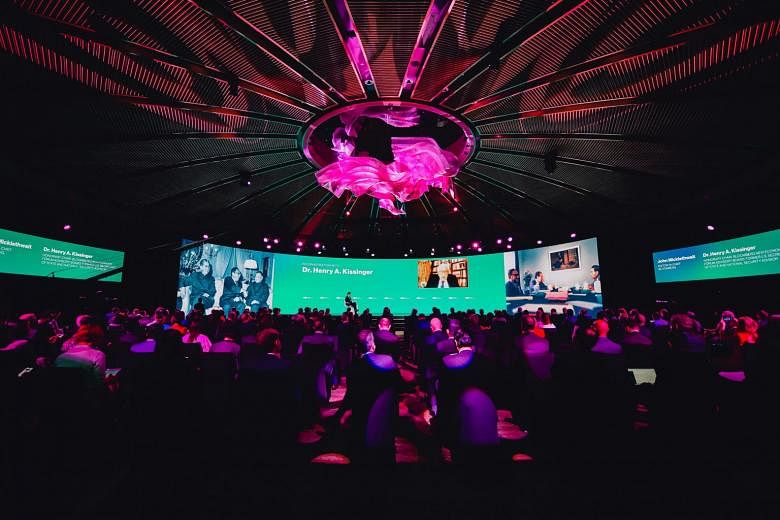John Micklethwait: The last physical meeting that we had of the New Economy Forum in 2019, you warned us about being in the foothills of a new Cold War with China. And then in the last virtual version of this, you thought we had reached the high mountain passes. That was back in the days of (former US president) Donald Trump. Since then, of course, we've had the Biden presidency and I think it'd be fair to say that the first period of the Biden presidency was one of increased tensions with China.
But over the past week, we have seen, in a sense, a kind of 'come down the mountain'. We have the deal to do with climate at COP and now, we've had this conversation between President Xi (Jinping) and President (Joe) Biden.
Are we beginning to come down the mountain or do you still see this as a relationship heading in the wrong direction?
Henry Kissinger: I'd say we're through the mountain pass on a precipice from which you can look in both directions and now it depends which direction is chosen.
Micklethwait: Beyond the edge of a precipice is never normally a good start. But all the same, on the necessary conditions for us to start coming down the mountain, what do you think America needs to do? What does Mr Biden need to do to help change this relationship, if he wants to do that?
Kissinger: I think both sides have to accept, adopt a view that a conflict between major technical powers of comparable capacities must not occur for the preservation of humanity, and they therefore have to decide that they will attempt to compose their differences to a level in which coexistence becomes not only possible but essential.
I think the conversations of the last few days were a good beginning of this statement of a possible move. They now have to be followed by concrete discussions that lead in the direction both presidents have affirmed they want to pursue.
Micklethwait: Are you convinced about China's good intentions in this? If you talk to a lot of people in the United States, or indeed in the West, they will say that China is... bent on becoming a bigger power, and that America and other things are in its way. It wants to go its own way, it is merely biding its time.
Kissinger: My task as a student of foreign policy is not to merely psychoanalyse the Chinese regime. I assume that Chinese leaders will work towards the maximum capability of their country. Our task as Americans and non-Chinese is to understand what we need to do to make sure that there is at least equivalence and in no case subordination.
If we understand that, and if the Chinese understand their interests, as I believe they are very capable of, then it should be possible to make arrangements by which the level of competition is reduced to a point that makes even cooperative measures possible.
I'm assuming that China will operate at a high level of its capacity because it is a Confucian tradition and engineered in Chinese history. It is our obligation to work at an equivalent level of capacity, and then to ask ourselves whether the world will not be better off if we deal with the outstanding issues like climate change, like artificial intelligence (AI), like economic relationships, from the point of view that leads to benefit for both sides.
Micklethwait: Artificial intelligence. You have a book about it, The Age Of AI, and it is a large part of the competition between China and America. In your book, you describe AI as the biggest change in human thinking since the Enlightenment. How do you see the contest between the US and China in terms of artificial intelligence?
Kissinger: Well, artificial intelligence is a departure in human thinking comparable to that which produced the Enlightenment. So a whole new school of intellectual evolution is bound to develop when the results are achieved by achieving a result without exactly knowing what the reason for it is, but knowing that it is produced by an algorithmic understanding of a huge change in human thinking.
Now, China has the same challenge: how to adjust its thinking to this reality? Now, if we deal with this in entirely competitive terms, and if we try to determine who is superior, and if we don't even know how to define a level, what the level of superiority is, which is strategically useful, we could be engaging in a race which, as a result of accidents, leads to consequences which we cannot foresee.
So I would hope that a way will be found by which technological discussions between the two sides take place which permit also the adjustment of economic competition. Neither side will accept a permanently inferior standing, but both sides have to understand that the other will not concede a permanently superior standing.

